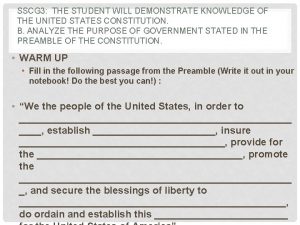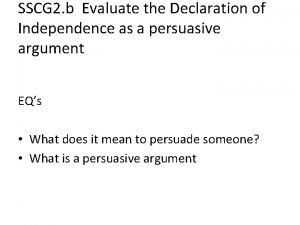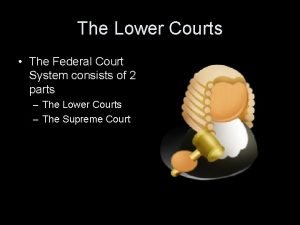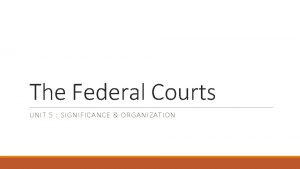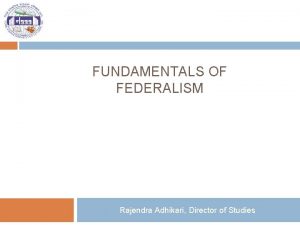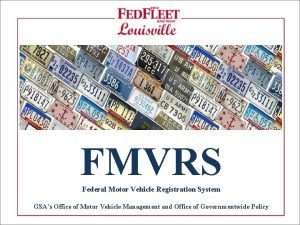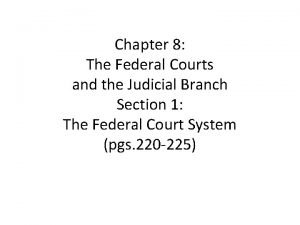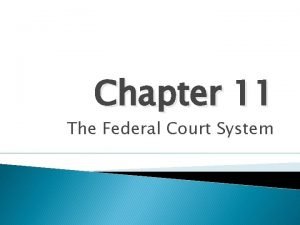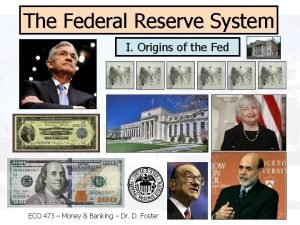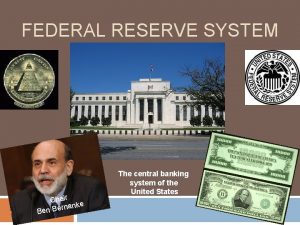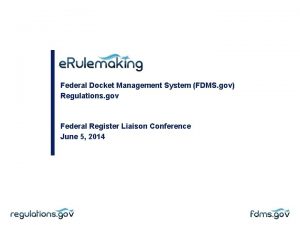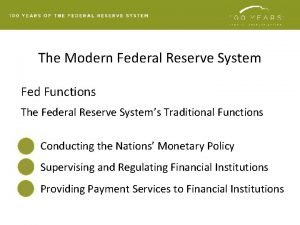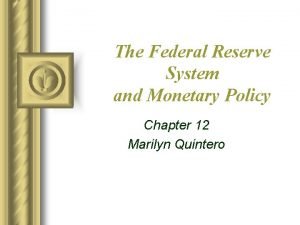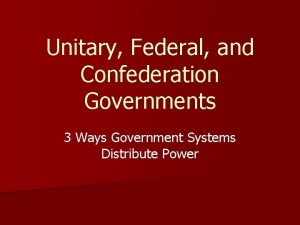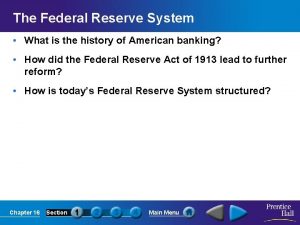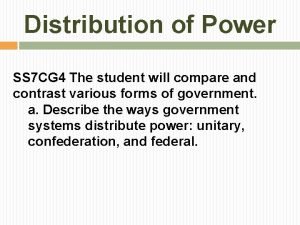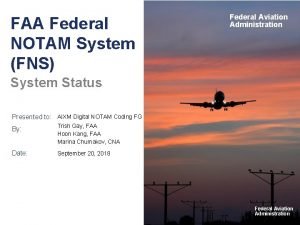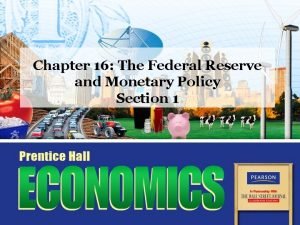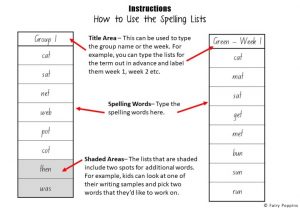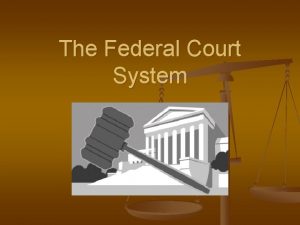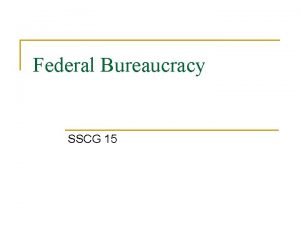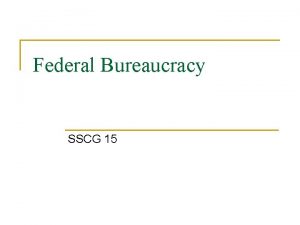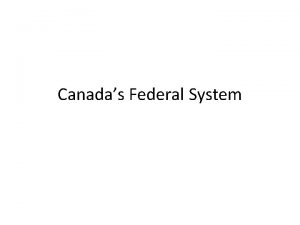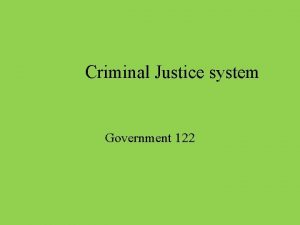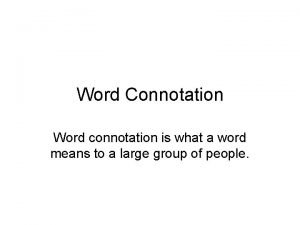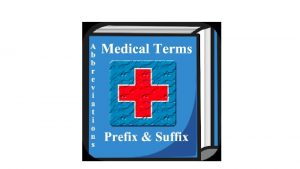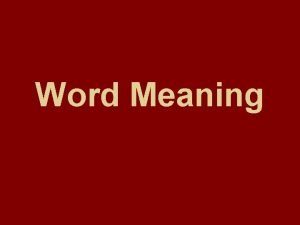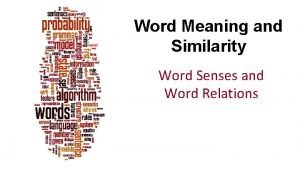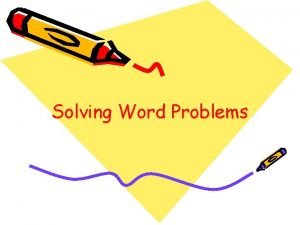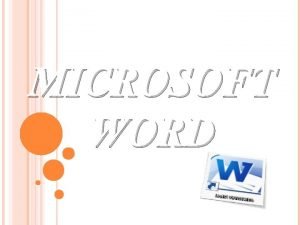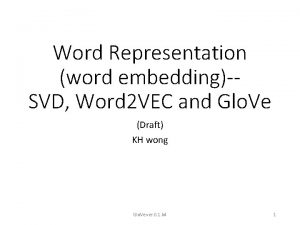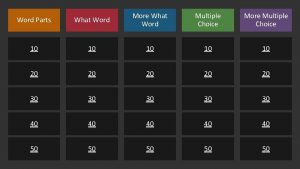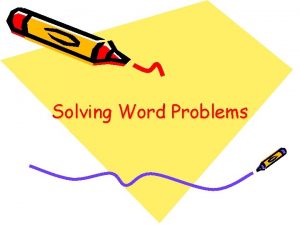The Federal System SSCG 5 The word federal


























- Slides: 26

The Federal System SSCG 5

§ The word federal denotes alliances between independent sovereignties. § Federalism is a system in which the power to govern is shared between national, state, and local governments. § If a conflict exists between the state and federal government, the supremacy clause mandates that federal laws are supreme.

§ The U. S. federal system has five basic characteristics: § * Federalism provides a division of legal authority between state and national governments. Overlap occurs, but two legally distinct spheres of government exist. § * The states are subordinate to the national government in such areas as management of foreign affairs and regulation of interstate commerce. § * Federalism enables positive cooperation between state and national governments in programs pertaining to education, interstate highway construction, environmental protection and health, unemployment, and social security concerns. § * The U. S. Supreme Court serves as legal arbiter of the federal system in regard to conflicting claims of state and national governments. § * The two levels of government exercise direct authority simultaneously over people within their territory. Dual citizenship exists under federalism, and individuals can claim a wide range of rights and privileges from both state and national governments


§ What state governments may not have the power to do: § May not enter into treaties with other countries § May not print money § May not tax imports or exports § May not Impair obligations of contracts § May not suspend a person's rights without due process

§ What the federal government can not do: § May not violate the Bill of Rights § May not impose export taxes among states § May not use money from the Treasury without the passage and approval of an appropriations bill § May not change state boundaries.

§ The state or federal government can not: § Grant titles of nobility § Permit slavery (13 th Amendment) § Deny citizens the right to vote due to race, color, or previous servitude (15 th Amendment) § Deny citizens the right to vote because of gender (19 th Amendment)

§ Article VI contains the supremacy clause, establishing that the Constitution, laws passed by Congress, and treaties of the U. S. are the supreme law of the land.

§ The national government must do three things for the states: (1. ) must guarantee a republican form of government; (2. ) protect from invasion and domestic violence; and (3. ) respect the territorial integrity of each state.

Supremacy Clause § In 1819, Mc. Culloch vs. Maryland brought up the issue of state vs. national government and who had the most power. § Congress chartered The Second Bank of the United States. In 1818, the state of Maryland passed legislation to impose taxes on the bank. James W. Mc. Culloch, the cashier of the Baltimore branch of the bank, refused to pay the tax. § The Supreme Court invoked the Necessary and proper Clause in the. Constitution, which allowed the Federal government to pass laws not expressly provided for in the Constitution's list of express powers as long as those laws are in useful furtherance of the express powers.

Relationship of federal and states § The Constitution says each state must recognize the laws and legal proceedings of other states – “full faith and credit. ” § This applies only to civil law – laws relating to disputes between individuals, groups, or with the state.

Relationship of federal and states § Extradition is the legal procedure through which a person who has fled to another state is returned to the state where the crime took place.

Relationship between State and Local Government § States are seen as unitary governments because it has complete control over all units of local government. § Local governments are created through Incorporation which means a State establishes a city as a legal body. What next? § A city has to have rules and abilities to enforce those rules. This is called a charter.

Cities vs County § What is a cities job within the state? § A city is created to provide services to the residents. § Example: Water, Sewage, Trash, Police, fire, Recreation, Building control § What is the county for? § It is the administrator of the state legislation. § Example: Bainbridge High school, Sheriff, Property tax, elections, Coroner

Taxes § Congress may raise taxes and spend money for the general welfare of the people. Income Sales Estate Property Excise

Types of Taxes § Income Tax § A tax places on how much money(earnings) a person or corporation makes in a year’s time. § Paid on April 15 th each year § Number one source of revenue for the federal government. § Considered a progressive tax because it changes depending on the amount you make.

Types of Taxes § Sales Tax § A tax on commodities that is paid for by the purchaser of a product. For example, you buy a snickers bar $1. 00 you pay 1. 07 because of 7% tax § Number one source of revenue for the state. Which is why you see shop local signs. § Considered a regulatory or flat tax because it doesn’t matter how much money you have everyone pays the same amount.

Types of Taxes § Property Tax § A major source of local government tax revenue in GA. A tax on real property such as land, buildings, improvements on property. § This is what the state uses to pay teachers salaries.

Types of Taxes § Inheritance Tax § A tax levied on the real and personal property left by someone to an heir (relative or family member) after their death. § This is where wills come in. If someone doesn’t have a will then the property goes to the state and you go through Probate Court to get it back.

Types of Taxes § Excise (Luxury) Tax § A tax on items that are expensive or not needed. § This tax is on things such as cigarettes and alcohol to deter people from smoking. In the state of GA there is. 37 cents added to the federal 1. 27. § This tax is also on luxury items such as diamonds, airfare, expensive cars (Jaguars, Mercedes, Land Rovers, etc)

Relationship between People and Government § Democracy – defined as a form of government in which supreme authority rests with the people. § Popular Sovereignty – principle that the people are the source of any and all governmental power only with the consent of the governed.

Relationship between people and Government § How can the people effect the government? Do we really have a say? § Yes we do. Here’s how: Direct Democracy § Direct democracy means that the people are involved in the law passing or the origination of the law

Direct Democracy Examples § Initiative- a process in which a certain number of qualified voters sign petitions in favor of a proposed statue or constitutional amendment, which goes directly on a ballot § Example: Homecoming process § Write in names put on ballot Vote

Direct Democracy Examples § Referendum – a process by which a legislative measure is referred to the State’s voters for final approval. § Graduation location § Inside or at the stadium – community votes on which location best suits them but that decision effects all classes in the future

Direct Democracy Examples § Recall § What is recall? Removing an elected official from office. § Wait a minute! § How does this process work? § 1. A petition starts to get enough voters to put the recall on a ballot § 2. Name is put on a ballot § 3. A vote happens

 Sscg 3
Sscg 3 Sscg meaning
Sscg meaning Sscg(2)
Sscg(2) Why is the senate considered a continuous body
Why is the senate considered a continuous body Sscg2
Sscg2 Federal court system structure
Federal court system structure The us federal
The us federal यगत
यगत Gsa fmvrs
Gsa fmvrs Federal court system structure
Federal court system structure What court helps congress exercise its power
What court helps congress exercise its power Who created the federal reserve
Who created the federal reserve Fractional banking
Fractional banking Federal reserve system
Federal reserve system Docket management system
Docket management system What is the primary function of the federal reserve system
What is the primary function of the federal reserve system The three parts of the federal reserve system
The three parts of the federal reserve system Unitary government diagram
Unitary government diagram Federal reserve system history
Federal reserve system history Federal reserve system pyramid
Federal reserve system pyramid Federal court system chart
Federal court system chart Federal system of government
Federal system of government Notam manager training
Notam manager training The federal reserve system is overseen by the
The federal reserve system is overseen by the The federal reserve system worksheet answers
The federal reserve system worksheet answers Hát kết hợp bộ gõ cơ thể
Hát kết hợp bộ gõ cơ thể
